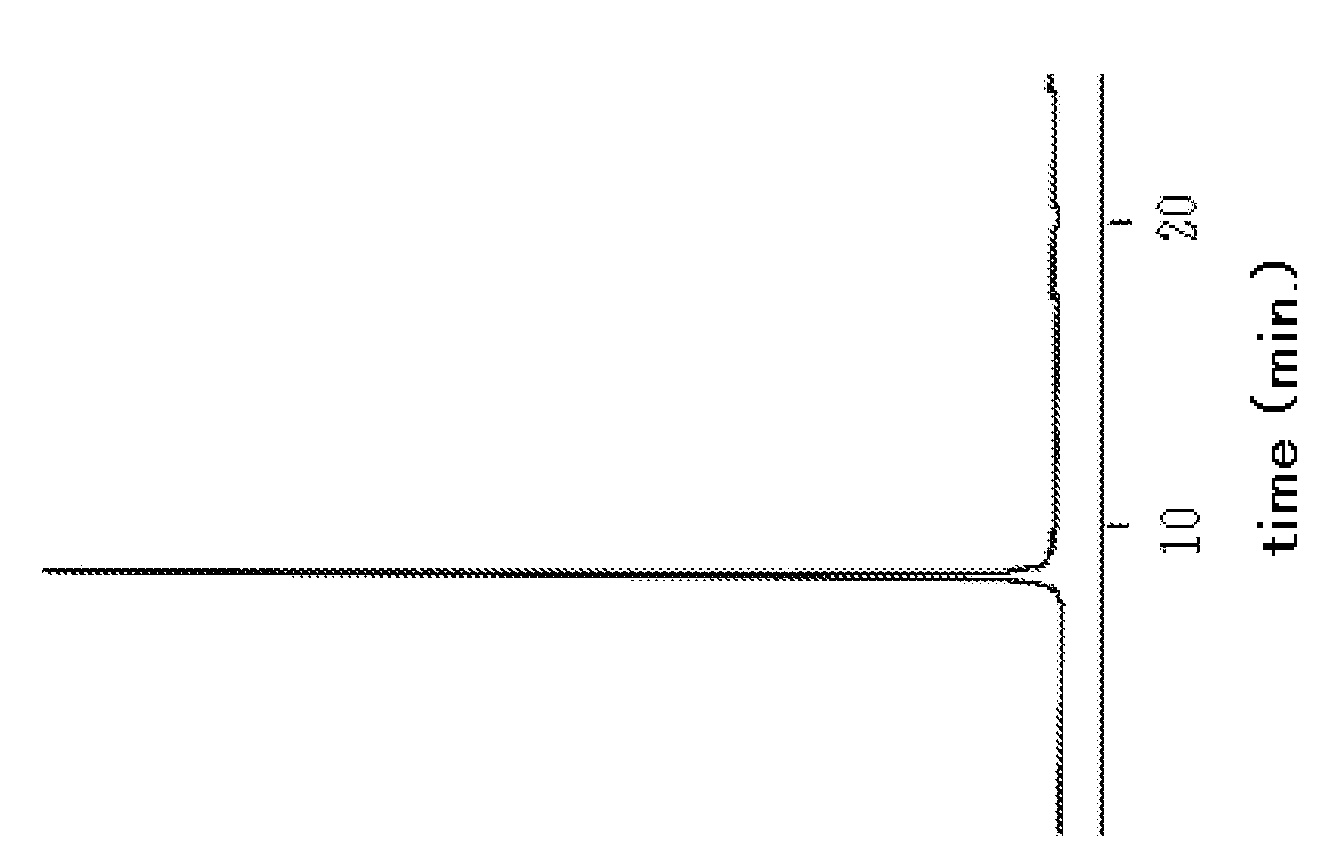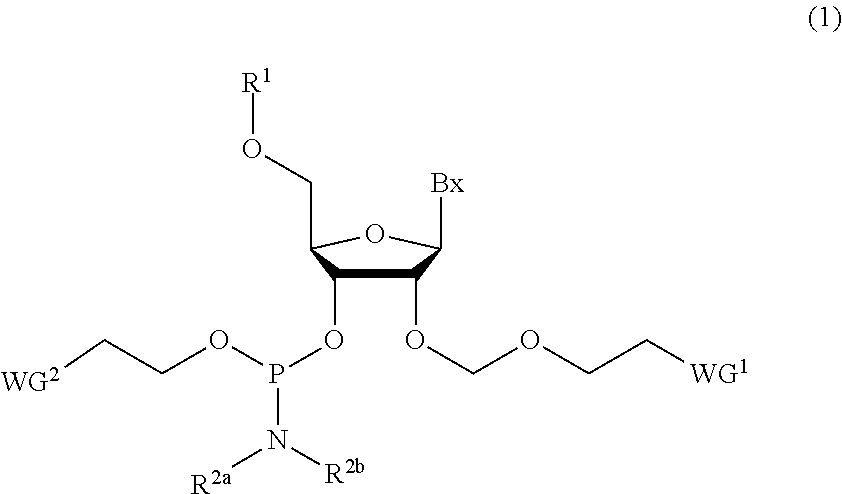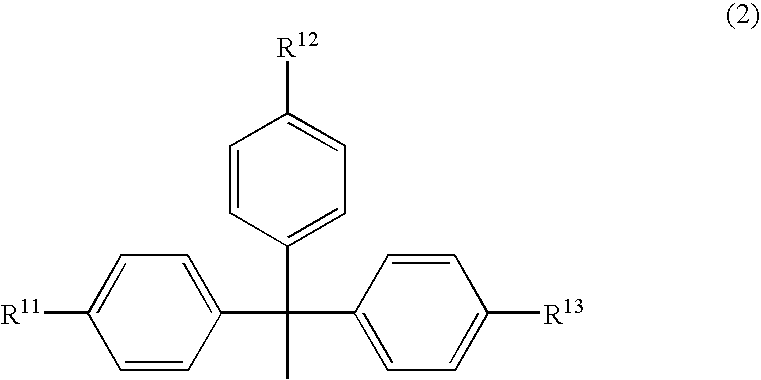Phosphoramidite compound and method for producing oligo-RNA
a technology of phosphoramidite and oligo-rna, which is applied in the field of new phosphoramidite compounds, can solve the problems of reducing the rate of condensation reaction, cleavage or rearrangement of the internucleotide linkage, and many more problems in the chemical synthesis of oligo-rnas, and achieves the effect of simple and high-yield methods
- Summary
- Abstract
- Description
- Claims
- Application Information
AI Technical Summary
Benefits of technology
Problems solved by technology
Method used
Image
Examples
example 1
Chloromethyl 2-cyanoethylether
Step 1
Production of methylthiomethyl 2-cyanoethylether
[0171]3-hydroxypropionitrile (32 g, 450 mmol) was dissolved in 450 mL of dimethylsulfoxide, and 324 mL of acetic anhydride and 231 mL of acetic acid were added thereto, and the reaction solution was stirred at room temperature for 24 hours.
[0172]Sodium bicarbonate (990 g) was dissolved in 4.5 L of water, and the reaction solution was added to the aqueous sodium bicarbonate solution dropwise over 1 hour. The reaction solution was stirred for 1 hour, and was subjected to extraction with ethyl acetate, and the extract was dried over anhydrous magnesium sulfate, and the solvent was distilled off. The obtained oily product was purified by silica gel column chromatography to obtain 41 g of methylthiomethyl 2-cyanoethylether as a colorless oily product (yield 70%).
[0173]1H-NMR (CDCl3): 2.18 (s, 3H); 2.66 (t, 2H, J=6.3 Hz); 3.77 (t, 2H, J=6.3 Hz); 4.69 (s, 2H)
Step 2
Production of chloromethyl 2-cyanoethylethe...
example 2
5′-O-(4,4′-Dimethoxytrityl)-2′-O-(2-cyanoethoxymethyl)uridine 3′-O-(2-cyanoethyl N,N-diisopropylphosphoramidite)
Step 1
Production of 5′-O-(4,4′-dimethoxytrityl)-2′-O-(2-cyanoethoxymethyl)uridine
[0178]5′-O-(4,4′-Dimethoxytrityl)uridine (546 mg, 1 mmol) was dissolved in 4 mL of 1,2-dichloroethane, and 452 mg of diisopropylethylamine (3.5 mmol) was added thereto, and 365 mg of dibutylstannyl dichloride (1.2 mmol) was further added thereto. The reaction was performed at room temperature for 1 hour.
[0179]Subsequently, the reaction was performed at 80° C., and 155.4 mg of chloromethyl 2-cyanoethylether (1.3 mmol) was added dropwise, and the reaction solution was stirred for 30 minutes.
[0180]After the reaction completed, the reaction solution was added into an aqueous saturated sodium bicarbonate solution, and was subjected to extraction with methylene chloride, and the extract was dried over anhydrous magnesium sulfate, and the solvent was distilled off.
[0181]The obtained mixture was purif...
example 3
2′-O-(2-Cyanoethoxymethyl)uridine
Step 1
Production of 3′,5′-O-(tetraisopropyldisiloxan-1,3-diyl)-2′-O-(2-cyanoethoxymethyl)uridine
[0186]3′,5′-O-(Tetraisopropyldisiloxan-1,3-diyl)uridine (150 mg, 0.3 mmol) was dissolved in 7 mL of tetrahydrofuran under an argon atmosphere, and 54 mg of methylthiomethyl 2-cyanoethylether (0.4 mmol) and 100 mg of molecular sieves 4A were added, and the reaction solution was stirred for 10 minutes.
[0187]The reaction was performed at 0° C., and 2 mL of a solution of trifluoromethanesulfonic acid (10 mg, 0.06 mmol) in tetrahydrofuran was added. Then, 92 mg of N-iodosuccinimide (0.4 mmol) was added, and the reaction solution was stirred for 1 hour.
[0188]After the reaction completed, the reaction solution was filtrated with a celite and washed with methylene chloride, and the obtained organic layer was washed with 1 M aqueous sodium hydrogen thiosulfate solution. The organic layer was washed with aqueous saturated sodium bicarbonate solution, and dried over ...
PUM
| Property | Measurement | Unit |
|---|---|---|
| temperature | aaaaa | aaaaa |
| temperature | aaaaa | aaaaa |
| temperature | aaaaa | aaaaa |
Abstract
Description
Claims
Application Information
 Login to View More
Login to View More - R&D
- Intellectual Property
- Life Sciences
- Materials
- Tech Scout
- Unparalleled Data Quality
- Higher Quality Content
- 60% Fewer Hallucinations
Browse by: Latest US Patents, China's latest patents, Technical Efficacy Thesaurus, Application Domain, Technology Topic, Popular Technical Reports.
© 2025 PatSnap. All rights reserved.Legal|Privacy policy|Modern Slavery Act Transparency Statement|Sitemap|About US| Contact US: help@patsnap.com



